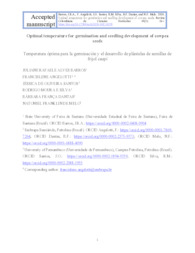Optimal temperature for germination and seedling development of cowpea seeds.
Optimal temperature for germination and seedling development of cowpea seeds.
Author(s): BARROS, J. R. A.; ANGELOTTI, F.; SANTOS, J. de O.; SILVA, R. M. e; DANTAS, B. F.; MELO, N. F. de
Summary: Temperature is one of the climatic elements that affect most the germination process and seedling development. Thus, the objective of this study was to evaluate the germination and seedling development of cowpea cultivars under increasing temperature. The seeds of the cultivars Acauã, Carijó, Guariba, Gurguéia, Itaim, Juruá, Pajeú, Potengi, Pujante, Rouxinol, Tapahium, and Tumucumaque were kept in germination chamber at temperatures of 20, 25, 30, 35 and 40°C, with photoperiod of 12 h. Cowpea seeds have optimal germination performance and seedling development at temperatures in the range of 30.49 - 35.48°C. The cultivars presented germination percentage above 91% under 40°C, however, the seedling were abnormal. The temperature of 20°C provided germination above 96%, but with a longer period to germinate. The temperature range between 30 - 35°C favored the germination speed index, average time, and seed germination speed, with optimum temperatures varying between the cultivars. The highest rate of normal seedlings was observed at temperatures between 25 and 35°C.
Publication year: 2020
Types of publication: Journal article
Unit: Embrapa Semi-arid Region
Keywords: Cowpeas, Desenvolvimento e mudas, Feijão, Feijão caupi, Germinação, Mudança Climática, Semente
Observation
Some of Embrapa's publications are published as ePub files. To read them, use or download one of the following free software options to your computer or mobile device. Android: Google Play Books; IOS: iBooks; Windows and Linux: Calibre.
Access other publications
Access the Agricultural Research Database (BDPA) to consult Embrapa's full library collection and records.
Visit Embrapa Bookstore to purchase books and other publications sold by Embrapa.

